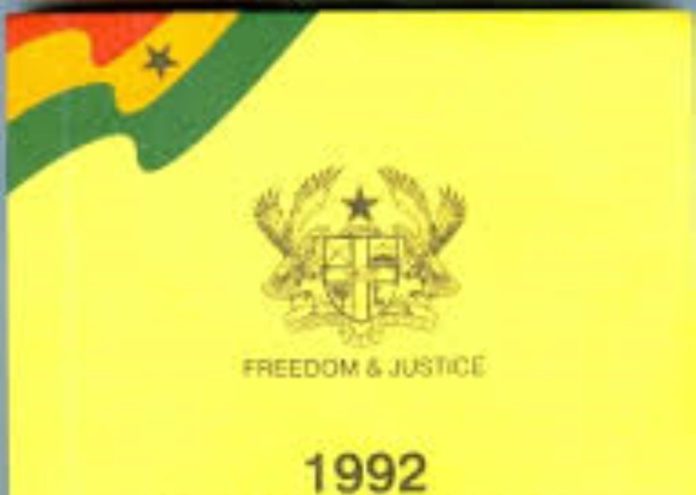An eight-year journey to have the 1992 Constitution translated into the Akuapem Twi dialect of the Akan language has become a reality.
The launch of the Akuapem Twi version of the Constitution in Accra happened last Wednesday.
The first Akuapem version translated by a distinguished lawyer, Kwasi Opare, is to offer local people the opportunity to understand the provisions of the Constitution and appreciate the content for their activities.
The translation, which has been made user-friendly by the adoption of transliteration and the use of neologism using the Akan spelling, captures all the preamble, the entire 26 chapters and two schedules.
The acting Dean of the School of Performing Arts at the University of Ghana, Professor Kofi Agyekum, speaking at the launch, called for such initiatives to be made a national project to have legal documents translated into local languages to help the citizenry to comprehend them and be able to use them effectively.
He said it was important to maintain local languages and culture through the translation and publication of essential documents such as the 1992 Constitution which he described as the “Ghanaian Bible”.
Prof. Agyekum, who commended Mr Opare for his foresight, indicated that “if we do not start to cherish and use our mother tongue now, and all of us are interested in the foreign languages at the expense of our own, it will be chaotic”.
The country, he observed, had suffered language imperialism since colonial days, which, he said, had compelled the nation to have all its official documents in the colonial master’s language.
“Sadly, our Constitution, the pillar of all our undertaking as a State, is also in English.
Where is our identity and cultural heritage then?” he asked.
Prof. Agyekum said although Ghanaians prided themselves in having gained independence since 1957, “we are still under linguistic bondage because of linguistic imperialism”.
Language, he said was an inalienable right and therefore Ghanaians must avoid language shift, language endangerment, language loss and language extinction by doing everything possible to protect, safeguard and document “our language for future generation”.
Local authorities role
He appealed to traditional authorities to take keen interest in indigenous languages in all forms of communication.
“We should not allow linguistic imperialism to thrive.
It will trample on our linguistic human rights.
Let us embark on active language decolonisation through translations like this one,” the renowned academic said.
Prof. Agyekum said it would be lovely to listen to speeches delivered by kings, chiefs and queen mothers in the indigenous languages, saying these would implant the love of the mother tongue into current and future generations.
Importance of project
Prof. Agyekum said the translation of the Constitution into the Akan language had a lot of benefits for the country as ethnologically, the Akans occupied most of the south and middle part of the country and located in nine of the 16 regions.
With 13 dialects in Akan, including Asante, Akuapem, Fante, Akyem, Bono, Kwahu, Agona, Wasa, Denkyira, Assin, Twifo and Akwamu, which were mutually intelligible, the Akuapem Twi Constitution would benefit a large population of the country, given that 47.5 per cent of the country’s population of 34.218 are Akans.
Furthermore, with the Akan language as a lingua franca, the Twi Constitution could benefit people from other tribes.
The Chief of Adumasa, Nana Ansah Kwaw IV, who launched the book, said he was happy this was happening in his time, emphasing that the use of local dialect was important for national development.
He appealed to the National Commission on Civic Education to promote the book on a larger platform to reach a lot of people for its usage.
The translator, Mr Opare said, fulfilling the dream would enable a lot of Ghanaians to understand the provisions of the Constitution and appreciate their civic responsibility while holding duty bearers accountable to the laws of the country.
He expressed appreciation to Prof. Agyekum and a former lecturer of the University of Ghana, the late Appenteng Sackey, for their support towards the successful completion of the work.
ALSO READ:

